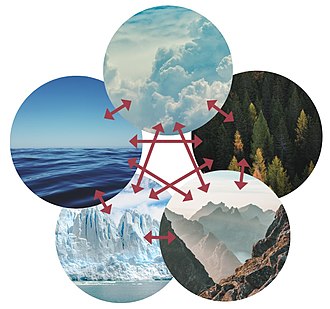
Earth's climate system is a complex system with five interacting components: the atmosphere (air), the hydrosphere (water), the cryosphere (ice and permafrost), the lithosphere (earth's upper rocky layer) and the biosphere (living things).[1]: 1451 Climate is the statistical characterization of the climate system.[1]: 1450 It represents the average weather, typically over a period of 30 years, and is determined by a combination of processes, such as ocean currents and wind patterns.[2][3] Circulation in the atmosphere and oceans transports heat from the tropical regions to regions that receive less energy from the Sun. Solar radiation is the main driving force for this circulation. The water cycle also moves energy throughout the climate system. In addition, certain chemical elements are constantly moving between the components of the climate system. Two examples for these biochemical cycles are the carbon and nitrogen cycles.
The climate system can change due to internal variability and external forcings. These external forcings can be natural, such as variations in solar intensity and volcanic eruptions, or caused by humans. Accumulation of greenhouse gases in the atmosphere, mainly being emitted by people burning fossil fuels, is causing climate change. Human activity also releases cooling aerosols, but their net effect is far less than that of greenhouse gases.[1]: 1451 Changes can be amplified by feedback processes in the different climate system components.
- ^ a b c d IPCC, 2013: Annex III: Glossary [Planton, S. (ed.)]. In: Climate Change 2013: The Physical Science Basis. Contribution of Working Group I to the Fifth Assessment Report of the Intergovernmental Panel on Climate Change [Stocker, T.F., D. Qin, G.-K. Plattner, M. Tignor, S.K. Allen, J. Boschung, A. Nauels, Y. Xia, V. Bex and P.M. Midgley (eds.)]. Cambridge University Press, Cambridge, United Kingdom and New York, NY, USA.
- ^ "Climate systems". climatechange.environment.nsw.gov.au. Archived from the original on 2019-05-06. Retrieved 2019-05-06.
- ^ "Earth's climate system". World Ocean Review. Retrieved 2019-10-13.